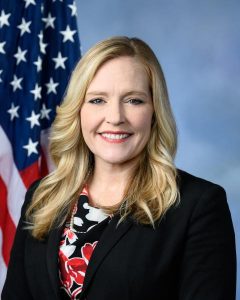
(Washington, D.C.) – Congresswoman Erin Houchin (R-IN-09), a member of the House Education and the Workforce Committee and the bipartisan House Dyslexia Caucus, introduced the 21st Century Dyslexia Act. The bill would modernize Dyslexia identification to avoid the chance of the learning disability going unidentified in students.
As a mom to a now-high schooler with Dyslexia, Congresswoman Houchin has been contending on behalf of students with learning disabilities since her son’s diagnosis in the third grade.
“I’ve been continually disappointed in how students with Dyslexia are left to fend for themselves in our education system. I remember the years of sleepless nights and wrong information that delayed my own son’s diagnosis and ultimately delayed his ability to receive appropriate accommodations. Our family’s story isn’t unique, which is why the 21st Century Dyslexia Act is necessary,” said Congresswoman Houchin.
Congresswoman Houchin introduced this legislation alongside Senator Bill Cassidy (R-LA), who introduced the same legislation in the Senate, making the bill bicameral.
“We know how to teach a student with dyslexia and help them reach their full potential. Unfortunately, a student is often not screened for dyslexia until after they have already fallen behind, if at all,” said Dr. Cassidy. “This legislation brings a 21st-century approach to dyslexia based on science that allows children with dyslexia to achieve their God-given potential.”
In addition to Senator Cassidy, the legislation is cosponsored by Representatives Julia Brownley (D-CA-26), Larry Bucshon (R-IN-08), and Bruce Westerman (R-AR-04).
“Students with dyslexia face unique challenges and should have access to the resources and supportive learning environments they need to live up to their fullest potential,” said Rep. Julia Brownley, co-chair of the Congressional Dyslexia Caucus. “By reclassifying dyslexia as its own category within the Individuals with Disabilities Education Act, this legislation raises the much-needed awareness of the most common learning disability among American students and provides the proper accommodations and services for these students. As the mother of a child who struggled with dyslexia when she was in school, I know the importance of this issue all too well. That is why I am committed to continuing to work with my colleagues of the Congressional Dyslexia Caucus to ensure that all individuals living with dyslexia can thrive and succeed.”
“My experience as a father of a child with dyslexia has taught me that despite its commonality, this condition is often difficult to detect and treat,” said Dr. Larry Bucshon. “I’m honored to cosponsor the 21st Century Dyslexia Act, which aims to provide the proper support to children with dyslexia, allowing them to overcome the challenges they face to succeed in school and in their professional careers. This legislation will help emphasize the valuable contributions individuals with dyslexia can make, brightening our nation’s future.”
“For far too long, students with dyslexia have faced a mountain of obstacles to learn in a way that’s best suited to them. Educators weren’t properly trained and parents often felt powerless to help their children who struggled with dyslexia. I’ve been honored to meet many of these students and parents during my time as the co-chair of the Congressional Dyslexia Caucus, and I know that their futures are bright when we equip them with the tools they need for success. I’m proud to once again lead this important legislation alongside Congresswoman Houchin and Dyslexia Caucus Co-Chair Brownley, and I hope it serves as a roadmap for raising dyslexia awareness and giving schools across the country the right resources to educate the next generation,” said Chairman Bruce Westerman, co-chair of the Congressional Dyslexia Caucus.
Sally Shaywitz, the co-founder director of the Yale Center for Dyslexia & Creativity said, “With this new act, dyslexic boys and girls are truly and finally able to enjoy the benefits of 21st century science – somethings they unfortunately have been deprived of for far too long. Beginning with the evidence-based definition of dyslexia as unexpected, dyslexic students can now know their condition has a name “dyslexia,” that they are part of a community and importantly, they can be very smart. At last, scientific evidence is leading the way for educating–screening, identifying, and teaching–students who are dyslexic, resulting in a better, much-deserved future for these dyslexic boys and girls. We possess the knowledge. Now, we must act to translate this knowledge into policy and practice. The critical issue now is acting on this knowledge – what we have is an Action Gap!! Our children have waited long enough, we must ACT!”
“I’ve been working with Sally and Bennet Shaywitz, the co-founders directors of the Yale Center for Dyslexia & Creativity, since my time in the Indiana General Assembly on universal screening laws and drafting our state definition of Dyslexia in Indiana. I’m grateful for their support of this legislation and their continued fight for our students,” said Congresswoman Houchin.
Currently, Dyslexia is included as one of many neurocognitive differences under “Specific Learning Disabilities” (SLD) in the Individuals with Disabilities Education Act (IDEA). Despite Dyslexia being the most prevalent neurocognitive difference within SLD, students are rarely tested. This prevents them from getting the services and accommodations necessary to assist dyslexic students in learning to read. When children are not identified with Dyslexia, evidence shows lifelong harm can occur, including lower career wages, reduced graduation rates, and increased rates of incarceration.
This legislation helps students by pulling Dyslexia out of the overly broad definition of SLD and including it in the list of disabilities that define a “child with a disability,” thus classifying Dyslexia as its own category within IDEA.
For the bill text, click here.
(Office of Congresswoman Erin Houchin press release)



